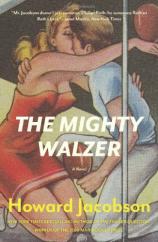Reading Group Guide
Discussion Questions
The Mighty Walzer

1. The Mighty Walzer opens with the story of Joel Walzer’s loss in the 1933 World Yo-Yo Championships, with his enormous, homemade Yo-Yo. What does this scene tell us about Oliver’s father and the Walzer family legacy? What traits has Oliver inherited from this failed Yo-Yo champion?
2. Consider the setting of his novel: 1950s Manchester. How does the town look and feel through young Oliver’s eyes? When he returns forty years later, how has Manchester changed, and how has Oliver changed?
3. After Oliver’s first visit to the Akiva Social Club, he says of the ping-pong team, “They’ve all got something wrong with them.” (56) What is wrong with each of Oliver’s new peers: Sheeny Waxman, Twink Starr, Aishky Mistofsky, the Marks brothers, and Gershom Finkel?
4. Consider the character of Gershom Finkel. What is the source of Oliver’s rivalry with Gershom? How are Oliver and Gershom different, and what do they have in common? How does Oliver feel about Gershom’s downfall as a ping-pong player?
5. Oliver declares, “My ambition was to be crowned conclusive champion of Somewhere Else, not champion of Our Street.” (129–30) Does Oliver succeed in his ambition? Why or why not?
6. Compare the two women who capture Oliver’s heart: Sabine and Lorna. How are these two love interests similar, and how are they different? What attracts Oliver to each of them? Is Oliver’s marriage to Sabine a surprise? Why or why not?
7. Discuss Joel Walzer’s career as a salesman at local markets. How does Oliver get involved in his father’s business, and how does he feel about it? How does “swag” infiltrate the Walzer household, and what effect does it have on their lifestyle?
8. Describe Oliver’s relationship with his maternal aunts, the “Shrinking Violets.” Why did Oliver grow up in a household full of women? How was his sexuality shaped by his early years surrounded by these aunts? How does the Walzer family handle Gershom’s seduction of Dolly and Dora?
9. Review Oliver’s action-packed first day at Cambridge University. Who does he meet on his first day of school, and what impressions do these new people make on him? How does Oliver act differently now that he has left Manchester behind?
10. Discuss Oliver’s career at the end of the novel: teaching classes on women authors at small universities in Venice. How does Oliver end up as a lowly scholar instead of a mighty ping-pong champion? What regrets does he seem to have about his past?
11. Oliver says of his two children, “They were better off without me. The grandiose have no business fathering children. Especially the grandiose who like to lose big. That’s no example to set a child.” (328) Is it true that Oliver’s children are better off without their father? Why is there such a great distance between Oliver and his offspring? How does Oliver end up with two deeply religious children?
12. Oliver declares that as a ping-pong player, it is “mortifying to lose, mortifying to win.” (317) Why is Oliver embarrassed to lose at ping-pong? Why is he embarrassed to win? In what ways is Oliver his own worst opponent in a match?
13. Describe Oliver’s reunion with his old Manchester friends at the Ninth World Veterans’ Championships. How have the Akiva and Hagganah players changed in the past forty years, and how have they remained the same? What is the significance of Oliver’s unacknowledged reunion with Lorna? Is he satisfied that Lorna remembers him, or does he want more than recognition from her? Explain.
14. In Venice, Oliver learns that one of the ping-pong matches he remembers as a loss was in fact a win. As he puts it, “Can a person be so wedded to defeat that he remembers it even where it wasn’t?” (321) Is Oliver Walzer a reliable narrator of his own history? Why would his memories be wrong?
15. Each chapter of The Mighty Walzer opens with a quotation about ping-pong. Find your favorite chapter and read the quotation at the beginning of it. How does the quotation set the scene for the chapter to come? Is Oliver following or breaking ping-pong’s rules and conventional wisdom in your chosen chapter?
16. Howard Jacobson dedicates The Mighty Walzer “For the boys of the J. L. B. and G. O. S. J. ping-pong teams, remembering the glory days,” which suggests that the novel is partly autobiographical. Why might Jacobson have decided to write a novel instead of an autobiography about his ping-pong days? Which characters and scenes of the novel feel particularly true?
The Mighty Walzer
- Publication Date: March 29, 2011
- Paperback: 400 pages
- Publisher: Bloomsbury USA
- ISBN-10: 1608196852
- ISBN-13: 9781608196852








